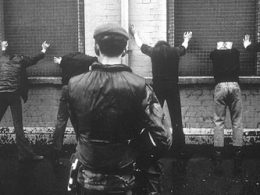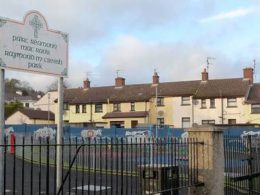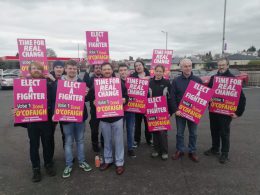By Gary Mulcahy
THE JOBS massacre spreading across Northern Ireland and Britain is devastating entire towns and communities. Unemployment in the North has surged by 62% in the past year. At least 1,000 jobs are expected to be lost every month this year, which would bring the number of officially unemployed above 52,000.
As well as job losses, workers have seen their wages cut. This onslaught against workers has also illuminated how conditions and rights have been undermined over many years. The use of agency workers and other groups of unorganised labour has been exploited by employers to undermine conditions and rights which were hard fought for by workers struggles in the past. The use of immigrant labour at the Lindsey Oil refinery plant in England was an attempt to undermine the power of construction workers trade union organisation. The Financial Times reported that one of the reasons bosses were hiring immigrant workers was to try and end workers traditions in the industry of illegal solidarity stoppages, and even to end workers say over tea-breaks!
The victorious unofficial strike by these workers which led to improved conditions for the workforce, including immigrant workers, is a result of years of struggling to maintain strong principled union organisation in the workplace.
Unfortunately, the majority of workers falling victim to the economic crisis have been weakened in their ability to defend jobs and conditions as a result of the policies of the leadership of most unions. The benefits to employers of hiring agency workers is now all too clear. Agency workers can be sacked en masse at the drop of a hat without any proper notice and are not entitled to a penny in redundancy payments. There were violent scenes at the BMW’s Mini plant in Oxford after Unite officials announced to 850 agency workers (the entire weekend shift) that they were getting the sack and had one hour to leave the factory. Footage captured on mobile phones showed physical fights breaking out in the factory between workers and management and furious workers venting their anger at union officials. Incredibly, Unite had signed up with management to bring in agency workers, which has been used to undermine rights and conditions. This “partnership” approach of most union leaderships has stemmed from a flawed ideological acceptance that workers have to go along with capitalism. Most union leaders capitulated to the bosses neo-liberal agenda over the past 20 years. That has resulted in some union leaders doing the job of the bosses by negotiating wage cuts and job losses. Even so-called ‘left’ union leaders like joint General Secretary of Unite Tony Woodley have lobbied the New Labour government to bail-out the bosses of the car industry. But the bail-out which Woodley has campaigned for won’t save jobs in the car industry. It will require the nationalisation of the car industry and the development of a plan of production democratically drawn up by workers to secure employment and jobs for young people. Such a plan would have to examine adapting the skills of the workforce to produce socially useful products such as green-friendly public transport vehicles etc.
In Northern Ireland, the announcement of 235 planned job losses by bus maker Wrightbus in Ballymena represents a huge blow to the workforce and wider working class in the area. The response of the union, in this case Unite, has not been encouraging. In a BBC interview a union official stated “The company have given very firm undertakings to us that they will work with us over the next three months to try to reduce that even further. And they have lots of good ideas in respect of that and I have to say that that is very, very encouraging because I haven’t yet come across a situation where the employers have said that they mean to do this and actually do it. I mean there is a clear indication from this employer that they mean to do it, and as far as we’re concerned as a union we’ll be working with them.” This echoes the response of most unions to the crisis, one of negotiating job losses and wage cuts, rather than fighting against all job losses and cuts in wages.
The necessity of fighting unions with leaderships prepared to fight the bosses and defend jobs is also mirrored politically in the bankrupt policy of appealing to the Labour Party to come to the rescue of workers. The unions should break the link with Labour which is understood by most working class people to be a right-wing party. In Northern Ireland the union leaders also prop up right-wing parties, which is even more dangerous given the sectarian character of the Assembly parties. The Socialist Party stands for fighting unions with officials democratically elected by the members and living on the wages of members. We also stand for the unions to support the establishment of mass parties of the working class to politically fight on behalf of the working class.









